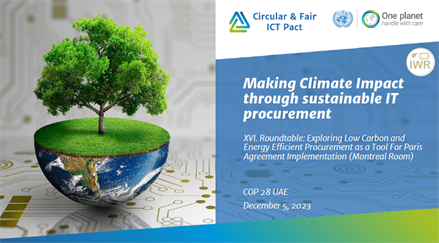Addressing climate impacts through procurement: What can that look like for ICT?
It will not have escaped anyone’s attention – the COP28 is in full swing. Most of us will agree that in order to address one of the most pressing challenges of our time, we all need to act. Circular and Fair ICT Pact (CFIT) participants are pleased to have been able to share their approach during a round table on “Low Carbon and Energy Efficient Procurement used as a tool for Paris Agreement Implementation”. This Round Table was hosted by UNEP and part of the “Climate Law and Governance Day 2023” on December 5th.
On behalf of CFIT , Marieke Weerdesteijn (CFIT Programme manager) and Johan Rodenhuis (representing CFIT participant The Netherlands) provided insights on how to address climate impacts in the procurement of ICT. Marieke shared that for a lot of ICT products, think of laptops, mobile phones, monitors etc., the vast majority of the climate impacts are linked to the supply chain of the product. This shapes the approach to addressing climate impacts through procurement, highlighting CFIT's strategies of buying fewer products and extending product lifespan. When you do procure ICT, there are various options available to ensure environmentally conscious decisions.
Johan Rodenhuis shared what that looks like in practice for The Netherlands. From a procurement policy perspective, it is interesting to see how in the Netherlands, The Paris Agreement has been translated into the Dutch Climate Agreement and a commitment to achieve climate neutral business operations of the central government in 2030. What that implies for Dutch procurement policy is laid out in the procurement policy “procurement with impact”. The Category IWR (Sustainable Workspace IT for the Dutch Central Government), translated these higher level policy goals into their Category Plan, which forms the basis for the sustainability ambitions of the tenders they negotiate. This translates in extensive sustainability requirements for a range of topics, including for example climate and energy, circularity and due diligence.
If we zoom in on climate and energy, you will find that a combination is made of buying products with a relatively low carbon impact (evaluated in the basis of LCA data) and a compensation of climate impacts using the Fairtrade Climate Standard. Under the responsibility of another procurement category, the Central Dutch Government only procures sustainable energy for use in its offices.
Curious to delve deeper? Explore the panel slides and the examples that relate to this topic on the CFIT website.
Share this
Panel slides CFIT

CFIT Framework and examples
CFIT is sharing good practice examples from procuring organizations. Check out the CFIT Framework and examples that focus on reducing climate impacts.
